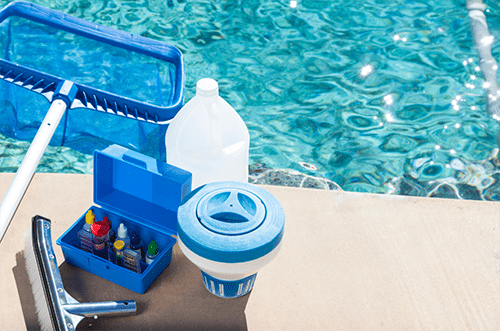Safety of Pool Chemicals: How to Dive In

Swimming pools are a source of great enjoyment and relaxation, but it’s crucial to stay safe, especially when it comes to pool chemicals. Understanding what they are, why they are used, and how to properly store and handle them helps pool owners create a safe and enjoyable swimming environment.
Understanding Pool Chemicals
Pool chemicals are used to promote clean water that is free of unwanted bacteria and algae growth. Chlorine tablets and granules or bleach-based shock products are among the most commonly used chemicals for this purpose. People can experience a potential poison exposure from accidentally inhaling powder from these products, or breathing in gas that is generated under certain conditions.
Storage and Handling
Proper storage and handling of pool chemicals is the best way to prevent poison exposures. Here are a few important tips to keep in mind:
- Store chemicals in a cool, dry, and well-ventilated area, away from direct sunlight, and anything that could cause a fire.
- Always keep chemicals in their original containers and tightly sealed. Make sure to keep them away and out of reach of children.
- Handle chemicals safely by following the instructions on the label. This includes wearing appropriate protective gear like gloves or goggles when handling chemicals.
- Always add chemicals to water and never the other way around, as this helps prevent splashing and accidental chemical reactions.
Mixing Chemicals
Mixing chemicals improperly can result in dangerous reactions and release toxic gasses. Never mix different types of chemicals unless instructed by a professional. For example, mixing chlorine and acid-based products can produce chlorine gas. Chlorine gas can cause irritation to the eyes, nose, and skin. When inhaled, the chlorine gas can irritate the lungs causing anything from a mild cough to difficulty breathing.
Handling Emergencies
Despite taking all necessary precautions, accidents can still happen. In case of accidental exposure or poisoning, it’s essential to act swiftly. Follow these first aid recommendations if someone accidently gets pool chemicals on their skin, in their eyes, breathes it in or ingests it. Never attempt to neutralize the pool chemicals with other chemicals as this can cause more harm.
Contact the Poison Help line at 1-800-222-1222 to speak with a poison control expert or or use our Get Help tool for an immediate recommended course of action.